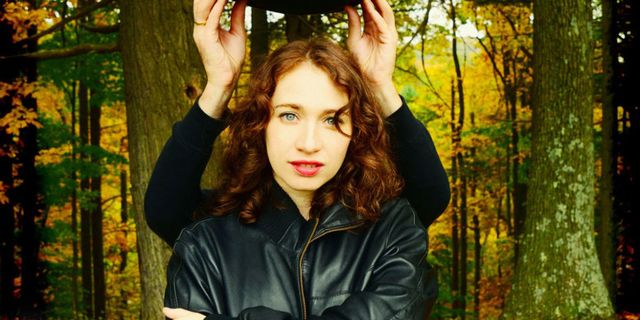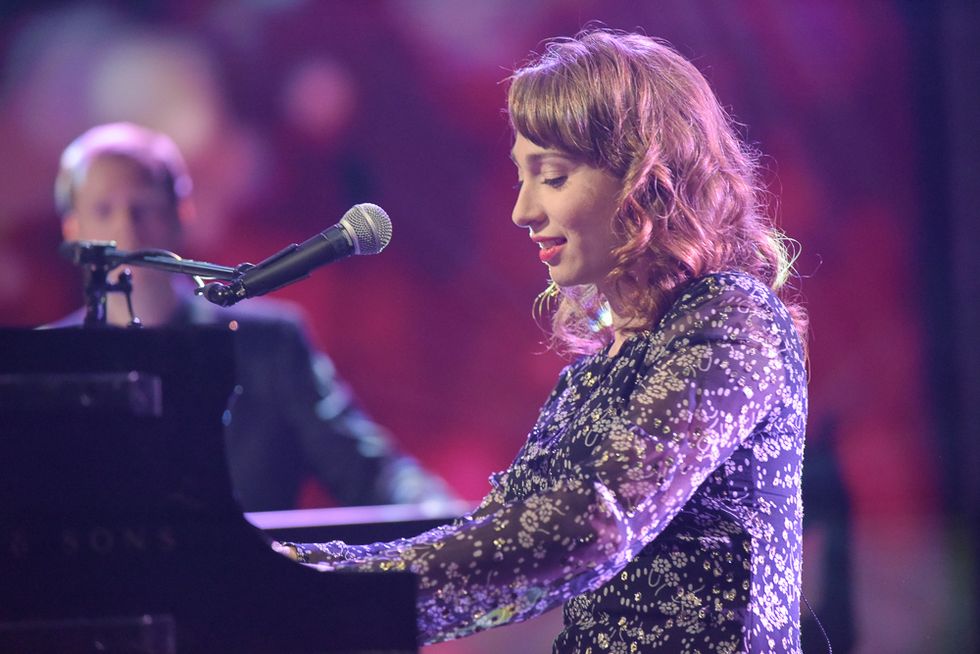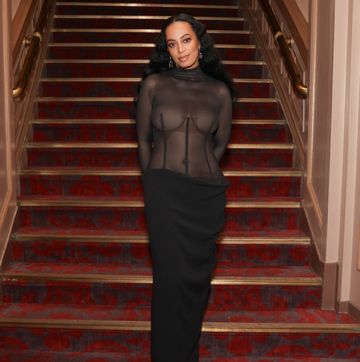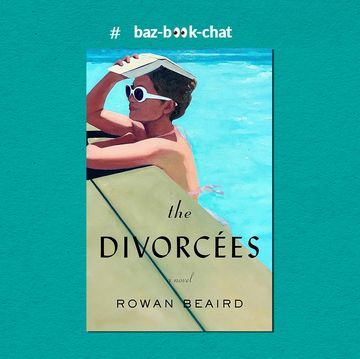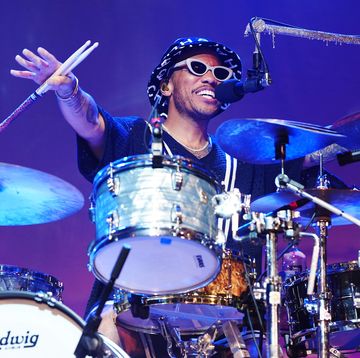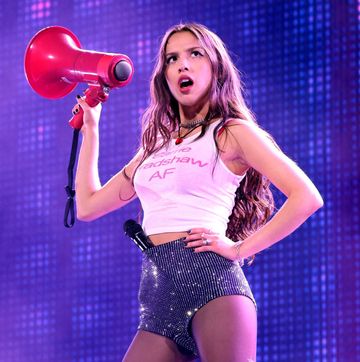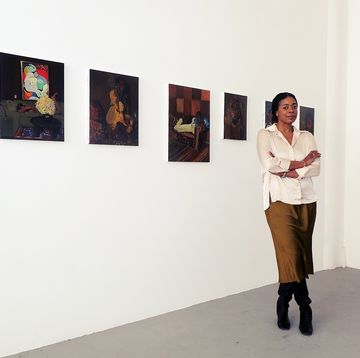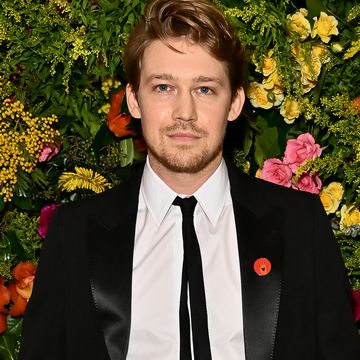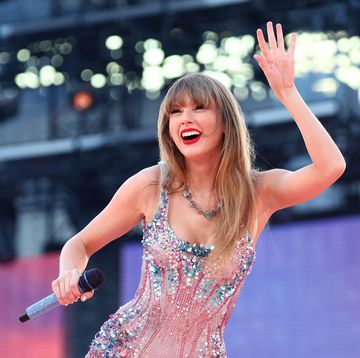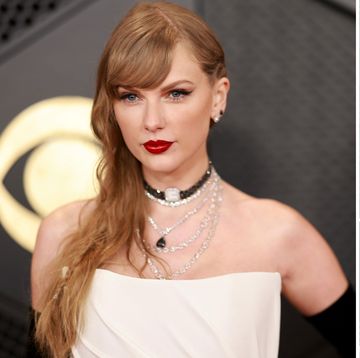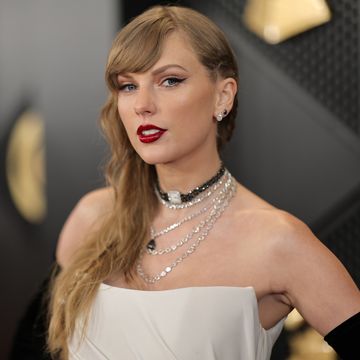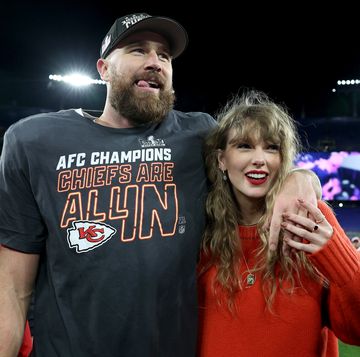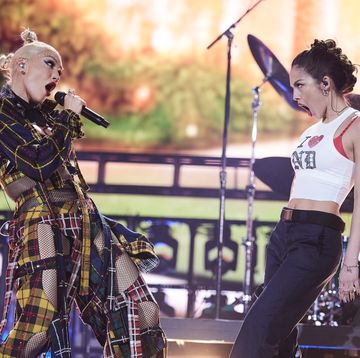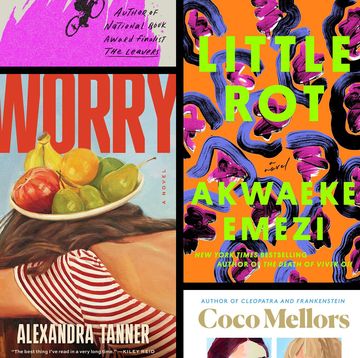"It doesn't at all look like the Madonna and her baby. It's not just peace and little rosy cheeks—it's f*cking hardcore, you know?" Regina Spektor chuckled on the phone. After giving birth two years ago, the beloved singer-songwriter has become familiar with the dirty work of motherhood. (She's not afraid to curse about it or throw the topic of "baby puke" into conversation.) But being a mom is also a blessing she doesn't take for granted. In fact, it provides the basis of her new album Remember Us to Life, her first in four years, which she released on Friday.
Known for her whimsical storylines and piano-led melodies, Spektor continues to show off her craft on Remember with vivid imagery and the kind of imaginative lyricism she's known for. The experience of talking to her, even on the phone, is surreally like listening to her songs. She speaks with a cadence that sounds like she's telling you an exciting bedtime story (I can only wonder what story-time for her child is like), and sometimes, she'll describe something with a rich metaphor that's reminiscent of the fantasy in her music—for example, she likened working on Chance the Rapper's "Same Drugs" to moving into someone's pre-furnished apartment.
The last time we heard new music from Spektor—besides "You've Got Time," her rocked-out theme song for Orange Is the Black—was with What We Saw from the Cheap Seats in 2012. That record, like the five before it, was a compilation of songs she had written throughout her career; some date back to when she was 18. Now, 15 years after her first album (11:11) and ten years after her attention-grabbing major label debut (Soviet Kitsch), she's premiering all newly-written music. She's also serving them with a generous helping of string arrangements, which she was purposefully very involved in, from the bellowing orchestra on "The Trapper and the Furrier" to the sampled strings in "Small Bill$."
"I felt like a lot of the emotion of the record could be translated to strings," she explained. "You know how when you walk into a building and say, 'Hi, how are you?' and they say 'Good, how are you?' and it's this empty thing, but then if you look into the person eyes, maybe what they really mean is. there's all this stuff going on and they're not good? I think that's the strings. The strings are the inner true feelings that the songs make."
Before her long-awaited release, Spektor talked to HarpersBAZAAR.com about the "inner feelings" behind her new music, being a mom and the Chance collaboration that almost was.
HB: It's been four years since you released your last album, I'm sure everyone's excited for the new one to come out.
RS: Yeah, the last tour ended three years ago, and then I had a baby. It's really awesome. Everyone's like, "Oh you went away then you came back" but I feel like I've been around. There were a few months where I was covered in baby puke, but I've been around.
HB: On the topic of motherhood, what was the process of writing completely new songs like as a new mom?
RS: I am very close with my parents, they are very amazing, so loving, so cool, and really valued art. I was the only kid whose parents weren't sad that they were going to become a musician, or trying to talk me into becoming a lawyer or doctor. As soon as I had the baby I was like, "F*ck! I had no idea how much you loved me." I had no idea! I mean you know it intellectually, but you really feel it. And I was like, "If they love me this much I don't even know what to do with this information." It was just too much.
So that was one of the very certain incredible things that you discover really connects you to your ancestors, to your family, to your heritage, to yourself, to your partner. It's a very emotional experience and at the same time, you're still yourself. It doesn't at all look like the Madonna and her baby, it's not just peace and little rosy cheeks, it's fucking hardcore you know. It really made me see that you can't walk around the planet and think, "Oh you have a baby, you can do both—you can take art, you can have a baby, you can have a career."
I felt personally that I was more creative, I was able to do more work than I had before, and I was able to really use my time more. If I had 30 minutes that I was sleep-deprived and covered in baby puke, I could go write a song. Whereas before, I could have wasted three days in a row, just thrown it away, now I could never do that. Now I have this little being to be there for and to play with and so I have to work hard and organize myself so that I'm present and not a slacker.
HB: What made you decide to write completely new music for this album rather than compiling songs from throughout your career like you did in your previous records?
RS: I was writing when I was pregnant a little bit. Most of the songs were after when I had all this sleep deprivation but this desire to use my time well. Then because I wrote so many, they just kind of seemed to go together. With all the previous records, I had these songs that would patiently wait their turn to get on the record and be fully produced, and this time they all just stayed there and I didn't rescue any of them.
I was so excited about these new songs and they seem to fit together. All my other records spanned years. It's always interesting to me to see people projecting things, like people would say, "This record is much more mature than your other record" and I would think, "Well, this record has more songs from when I was 18 on it than the other one." But the thing is, you are always growing, so maybe the way that you bring the songs forward and translate them is more mature. But it just felt like work of art that needed to go together—that's the only way I could describe it.
HB: Though you were working on your own music, you also got to work with Chance the Rapper for "Same Drugs." Even though that version didn't make it to Coloring Book, what was it like working with him?
RS: He called me and said, "I'm a really huge fan and I have this song and I'm going to send it to you and can you sing on it?" So he sent it to me and my husband and we went into the studio but the song was completed already. The song was what came out. So I said to him, "I don't really hear any space. What can I do on it? It feels like a finished song and it's great." He said to play around with it and find spots for ourselves, and then he muted the last verse and he said to just write something in there. I also wrote a little bit in this little piano bridge in the middle.
It was almost like if you're moving into somebody's apartment and they say, "I want you to live with me and keep all your stuff," and then you come in and they already have a bed, and they already have a desk and they already have a painting hanging. And you're like, "Okay I'll just come with my toothbrush," and that's how I kind of felt when I was working on it. I wrote this whole other ending to the song with other lyrics and I got really attached to it and they loved it, but it was all like, "Hurry the record has to come out!" Then he called me and was like, "I'm really sorry but I'm too attached to the one I have, so I'm just going to put that one out." But he was really sweet. I think it was more that he listened to my music for a long time and he wanted to do it, but I think if we ever do something together it should be something we actually do together from the beginning.
HB: Do you think we'll ever be able to hear your version of the song?
RS: I don't know, it's up to Chance. I mean, I have too much respect, I gave him what I had. I would never want somebody to put up a song of mine that I didn't approve. So, for now, it's just me and him that have it. But if he ever wants to put it out I'm never going to say no to him.
HB: You've already released a few singles off your album. Your first one, "Bleeding Heart," really stood out. People have been saying that it sounds more pop-influenced—was that intentional? Is that a style you wanted to veer into?
RS: Every song on the record sounds completely different from each other and that's really important for me. The way that I make records, I sort of take each song and I think about what it means. I don't think about, "How does this song that has more of an electronic mix prefix to a song that has a full orchestra next to a song that has other things?" I just work on it as-needed. This is kind of funny because that song was tricky; we had to produce it two different ways because we would start something and go down the road and it would feel really wrong to me. Art is arbitrary but it sort of reveals itself to be right or wrong anyway.
The way I heard the song when I wrote it, was in the world of romantic '80s. Like, it's sort of supposed to sound like The Breakfast Club feels. I have this obsession with the '80s because I missed all of it. I spent the '80s in the Soviet Union and when I came to America it was '89 and I was in an immigrant bubble and we didn't have MTV or cable, so I kind of discovered the '80s when I was already older, maybe in college. And I continued to have this romantic obsession with all those films and there's this sound I hear in my head and it's kind of this bittersweet romantic, dark sound. There are certain songs that have that feeling, like with some of Pat Benatar and Cyndi Lauper's songs. I just love it, so in my weird backwards way, it's my version of that feeling in that song. But if somebody didn't know that was where it was coming from they wouldn't even associate with it.
HB: Your lyrics are so narrative and storytelling, where does that come from?
RS: When I think of my art tribe—you know, my peeps [laughs]—there are certain people who are autobiographers that I really love. But for the most part, overwhelmingly, my tribes are the surrealists and the storytellers, in song and literature. I'm much more drawn to fiction, to short stories, and to plays, than I am to diarists. The same thing with music—I'm much more into someone who is telling stories than somebody who is writing a record about their breakup. It's just more interesting for me.
Remember Us to Life is available now. Stream it on Spotify below.
This interview has been edited and condensed for clarity.
Erica Gonzales is the Senior Culture Editor at ELLE.com, where she oversees coverage on TV, movies, music, books, and more. She was previously an editor at HarpersBAZAAR.com. There is a 75 percent chance she's listening to Lorde right now.
